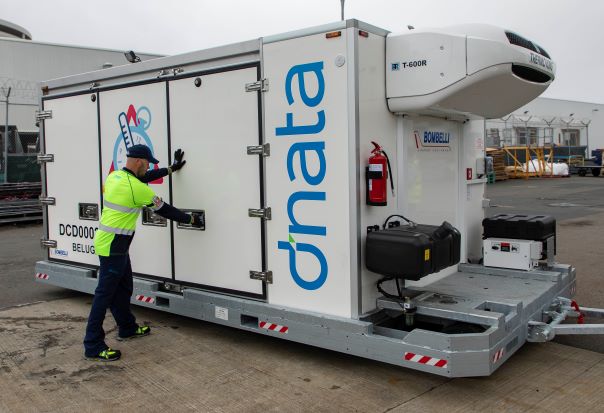Archives
Air, Freight News
dnata stays ahead in keeping cargo cool in Australia
[ February 19, 2021 // Gary G Burrows ]dnata continues to invest in leading-edge equipment to further enhance its pharma handling capabilities globally. The company has added four high-tech ‘cool dollies’ to its Australian cargo fleet, becoming the first air services provider to offer a fully integrated, temperature-controlled cool chain for pharma and perishable shipments in this important market.
Offering a closed, temperature-controlled system, the specialized containers will ensure safe and seamless delivery of temperature-sensitive goods, including pharmaceuticals and vaccines, between aircraft and dnata’s state-of-the-art cargo facilities.
dnata will operate two cool dollies each at Sydney Airport (SYD) and Melbourne Airport (MEL), providing maximum safety to airline partners and their customers at every stage of the handling process.
“We are thrilled to be the first cargo handler in Australia to launch advanced cool dollies in our operations,” said Dirk Goovaerts, dnata’s Regional CEO for Asia Pacific. “Our latest investment underlines our commitment to ensuring reliable and safe end-to-end transportation of pharmaceutical products across the supply chain. We stay focused on providing continual improvements that enhance the safety and security of our customers’ pharma shipments.”
Ramp transportation is one of the most vulnerable stages for temperature-sensitive cargo like pharmaceuticals. Offering world-class cool chain solutions, dnata consistently improves training and processes to transport these precious shipments to the highest international standards. Teams receive specialised training and temperature-sensitive cargo are given priority loading and unloading to ensure that they are moved quickly with minimised temperature fluctuation.
dnata’s new cool dollies allow the company to take pharma handling to a new level. Providing temperature-controlled storage from -25°C up to +25°C, the specialised containers mitigate risk of temperature deviations and contamination throughout the handling process. They have a closed structure with alarms on opening and closing, as well as alerts if temperatures fluctuate above acceptable ranges. The units are also hygienic and easy to clean, which is an important consideration for pharma cargo.
In recent years dnata has invested significantly in infrastructure, equipment and training to ensure that it provides shippers with a transparent and dependable cool chain product. The company has been using the latest technology, best practices and certified warehouses to deliver best-in class services for customers.
In Australia, dnata operates cool chain facilities in Melbourne and Sydney. Designed and built with flexibility and unique product requirements in mind, the facilities enable dnata’s cargo teams to offer an uncompromised temperature-controlled handling and storage solution to airline customers. The temperature-controlled areas in the facilities are monitored with web-based systems to facilitate real time management of all areas. In 2020, dnata’s Melbourne and Sydney facilities processed some 22,000 and 43,000 tonnes of temperature-sensitive pharma and perishable goods, respectively.
dnata is the only air services provider in Australia that has been awarded the World Health Organization’s (WHO) Good Distribution Practice (GDP) certification for the pharmaceutical handling services at its facilities. GDP is a program focused on systems for warehouses and distribution centres that store and distribute products that are medicinal or carry active pharmaceutical ingredients. Setting stringent standards, the scheme ensures that consistent quality management systems are in place throughout the entire supply chain. In achieving the certification, dnata proved its capability of handling pharmaceutical products safely and reliably.
dnata is a global member of Pharma.Aero, a cross-industry collaboration of pharma shippers, CEIV certified cargo communities, airport operators and other air cargo industry stakeholders.

Tags: Dnata









